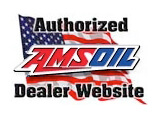02 Jul Most Powersports Engine Problems Are Either Mechanical, Fuel-Related Or Due To Neglect
AMSOIL offers products that can help avoid many of those problems
The last thing I want to deal with during my free time in the summer is engine problems. I want to be riding or getting my outdoor chores done, not diagnosing. If a diagnosis is required, I’m quick to remember that most engine problems or failures that affect powersports equipment are either mechanical, fuel related or due to neglect. Here are some of the most common problems that affect motorcycles, marine and handheld power equipment and strategies to prevent them.
Motorcycles: With motorcycles and motorcycle oils, heat is always an issue. In air-cooled bikes, motorcycle oil must provide adequate protection over a wide range of temperatures. In motorcycles with a shared oil sump, the oil must lubricate not only the engine, but the clutch and transmission, too. It must protect gears while providing sufficient grip to keep the clutch from slipping.
What can happen if the oil fails to perform? Imagine it’s the middle of summer and the engine overheats. The motorcycle will lose oil pressure and the engine will start to make enough noise to make most riders pull off the road and either push their bikes or call for help. A poorly lubricated transmission can result in gear wear, hard shifting and difficulty finding neutral. AMSOIL Synthetic Motorcycle Oil keeps gears lubricated, clutches working properly and provides heat protection when equipment is pushed to the limit.
Marine: Fuel-related issues are a major cause of problems in powersports applications, and particularly in marine equipment. These problems are specific to ethanol-blended fuels because ethanol has a strong attraction to water. If moisture is present in fuel, ethanol will detach from the gas and attach itself the water. The ethanol/water mixture then drops to the bottom of the fuel tank – the same location from where the engine draws fuel. When the engine tries to run on this mixture, all kinds of problems can occur, including lean burn and corrosion in the fuel lines, carburetors and fuel tanks. The AMSOIL solution is easy: Treat every tank of gasoline with Quickshot® (AQS) to ensure any moisture will be isolated and prevent the separation of gas and water.
Additionally, it’s important to follow these guidelines when purchasing or storing fuel for use in powersports applications:
• Use only fresh gas and buy fuel from outlets that have a high fuel turnover.
• Use fuel with an octane level equal to or above that recommended by the equipment manufacturer.
• Don’t store fuel for long periods of time, and only buy as much as you plan on using within the next 30 days. If fuel is stored longer than 30 days, be sure to add AMSOIL Gasoline Stabilizer (AST).
• Fuels containing up to 10 percent ethanol are usually acceptable in powersports equipment.
• Do not pre-mix any AMSOIL two-stroke oil with fuels containing more than 15 percent ethanol.
Handheld: Handheld equipment is largely powered by two-stroke engines. To pass emissions tests, this equipment is often designed to run on a lean air/ fuel mixture, which doesn’t leave much room for variances in fuel. And because this equipment is air-cooled, high temperatures can wreak havoc on the engine and lead to mechanical failure. When this happens, the engine oil is often blamed. AMSOIL SABER® Professional (ATP) is formulated specifically for high heat, high-rpm, lean-burn, air-cooled power equipment. It is purpose-built to keep your customers and their equipment on the job, working until finished.
Beyond mechanical and fuel-related issues, other common causes for failure in powersports applications include the following:
• Ingestion of abrasive materials, such as dirt and dust
• Rust and corrosion caused by improper storage
• Abuse or lack of proper maintenance
• Reaching the end of equipment life expectancy
Although it is possible to experience an oil-related problem, the likelihood that the difficulty relates to a deficiency with an AMSOIL product is extremely remote. As we’ve discussed, mechanical problems and failures do occur in powersports equipment. If the problem is oil-related, the following reasons are most common:
• The wrong fluid was used.
• Either too much or too little fluid was used.
• The lubricant was contaminated with dirt or water.
By simply using the right product in the right place in the right amount at the right time, many powersports engine problems can be avoided, and you and your customers can spend more time riding the roads, waters and trails and getting those weekend chores done, backed by the proven protection of AMSOIL products.

